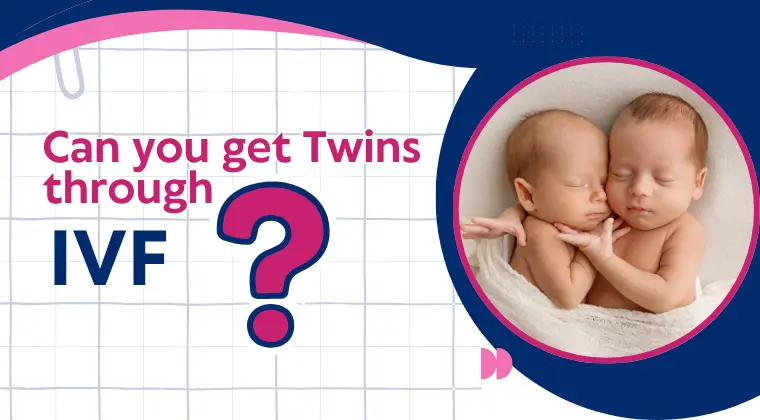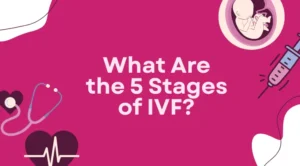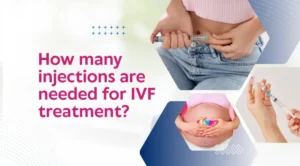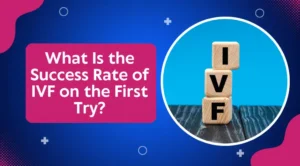When Priya and Rahul walked into our clinic in Sambhajinagar, they asked the question we hear almost every week: “Doctor, what are our chances of having twins through IVF?”
But beneath that simple question, we could sense something deeper—a mixture of hope, hesitation, and the unspoken fear of admitting they wanted something that might seem too ambitious after everything they’d been through.
If you’re reading this, you probably understand that feeling. After months or years of trying to conceive, there’s something beautifully human about dreaming of twins.
It’s not greedy. It’s not unrealistic. It’s simply the hope that if science can help you become parents, perhaps it can give you the complete family you’ve always imagined—all at once.
However, along with that hope comes questions, concerns, and a need for honest answers. Let’s talk about all of it—the medical facts, the emotional realities, and what you truly need to know about twins through IVF.
Is It Okay to Want Twins?
Yes, it is absolutely okay to want twins.
Your fertility journey has likely been filled with enough guilt and anxiety. Don’t add guilt about your dreams to that burden.
Many couples pursuing IVF consider twins as a way to complete their family after the struggles they’ve faced. This feeling is natural, valid, and more common than you think.
However, wanting twins and understanding the complete picture are both essential for making an informed decision
What Are Your Chances of Having Twins Through IVF?
In a normal pregnancy, there is about a 6% chance of having twins, while in an IVF pregnancy, there is approximately a 25% chance of conceiving twins. However, this number depends on several crucial factors:
Number of Embryos Transferred: This is the most significant factor. When two embryos are transferred, the chance of twins can be as high as 25-30% or more. Single embryo transfer reduces this to just 1-2% (only if the embryo spontaneously splits).
Your Age: Women under 35 typically see similar success rates whether a single embryo or multiple embryos are transferred, making single embryo transfer more attractive for younger patients.
Embryo Quality: High-quality blastocysts have better implantation rates, which influences both pregnancy success and twin likelihood.
Understanding the Risks of Twin Pregnancies
Twin pregnancies carry significantly higher risks than singleton pregnancies. This isn’t meant to scare you but to ensure you’re making a fully informed choice.
For Your Babies
Approximately 60% of twins are born prematurely at an average of 35 weeks, and more than half weigh less than 5½ pounds at birth. Premature and low-birth-weight babies face increased risks, including:
- Extended NICU stays and respiratory complications
- Long-term developmental delays, cerebral palsy, and vision or hearing problems
- Higher infant mortality rates
- Chronic health conditions requiring ongoing care
For You, the Mother
Twin pregnancies are harder on your body. The risks include:
- Pre-eclampsia: Significantly higher risk of dangerous high blood pressure
- Gestational Diabetes: Increased likelihood of pregnancy-related diabetes
- Premature Labor: Physical demands often lead to early delivery
- Cesarean Delivery: Much higher chance of requiring a C-section
- Increased Monitoring: More frequent doctor visits, ultrasounds, and possible bed rest
Financial Considerations
The average cost of IVF in India ranges between ₹1,50,000 and ₹2,50,000 per cycle, with fertility drugs adding ₹50,000 to ₹1,00,000. If complications arise with a twin pregnancy, NICU care and specialized treatment can significantly increase these costs.
Why Single Embryo Transfer Is Becoming Standard
Studies show a 47.3% success rate per patient with single embryo transfer compared to 58.6% with multiple embryo transfers.
However, when you add a frozen embryo transfer cycle using remaining embryos, cumulative success rates become comparable—but with dramatically lower risks.
At Endoworld, we evaluate each case individually. For younger women with good-quality embryos, single embryo transfer often provides the best balance.
For older patients or those with previous failed cycles, double embryo transfer might be appropriate after thorough risk-benefit discussion.
Making Peace with Your Decision
Whether you transfer one embryo or two, remember:
- Your desire for twins doesn’t make you ungrateful
- One healthy baby is better than two struggling babies
- You can still have more children through frozen embryo transfers
- Whatever happens will be your family’s story
Questions to Ask Yourself Before Making Your Decision
- What are my support systems? Do you have family support, financial resources, and childcare help for twins?
- How would I handle a premature birth? Are NICU facilities accessible? What would extended hospitalization mean for your family?
- What does my partner think? Both partners should be aligned on this decision.
- Can I afford potential complications? Are you prepared financially and emotionally for a high-risk pregnancy?
- Am I ready for a high-risk pregnancy? Can you manage more frequent monitoring and possible bed rest?
- What would life with twins look like? Have you considered caring for two newborns simultaneously?
Frequently Asked Questions
What are the chances of twins with IVF?
IVF pregnancies have approximately a 25% chance of twins compared to 6% in natural conception. With single embryo transfer, the chance is only 1-2%. With two embryos transferred, chances increase to 25-30% or higher, depending on your age, embryo quality, and medical history.
What are the risks of IVF twins?
For babies: About 60% of twins are born prematurely with increased risks of NICU admission, respiratory problems, developmental issues, and infant mortality.
For mothers: Higher risks of pre-eclampsia, gestational diabetes, premature labor, C-section delivery, and postpartum complications.
Other considerations: Increased medical monitoring, potential NICU costs, and greater childcare demands.
Can one embryo split into twins in IVF?
Yes. A single embryo can split into identical twins in approximately 1.5-2% of IVF pregnancies, slightly higher than natural conception. This creates monozygotic twins who share the same genetic material.
Factors like embryo manipulation, assisted hatching, and blastocyst transfers may slightly increase splitting chances.
Even with single embryo transfer, there’s a small possibility of identical twins—something doctors cannot predict or control.
What age is best for IVF twins?
There isn’t a “best age” for twins specifically, but age impacts success and safety:
Under 35: Highest success rates, similar results with single or double transfer, lower pregnancy risks. Single embryo transfer strongly recommended.
35-37: Success rates decline slightly. Decision between single and double transfer becomes more individualized.
38-40: May benefit from two embryos to maximize success, but twin pregnancy risks increase with maternal age.
Over 40: Significantly lower success rates, may be offered double transfer more often, but face substantially higher risks during twin pregnancies.
The medical recommendation prioritizes one healthy pregnancy over twin complications, especially as age increases.
How are twins formed in IVF?
Fraternal (Dizygotic) Twins: The most common type in IVF. Two separate embryos are transferred, both implant successfully, and each develops into a baby. They’re genetically like regular siblings and can be two boys, two girls, or one of each.
Identical (Monozygotic) Twins: Occur when one embryo spontaneously splits after transfer (1.5-2% chance), creating two genetically identical babies of the same sex.
The only controllable factor is the number of embryos transferred. With two embryos, you might get no pregnancy, a singleton, fraternal twins, or, rarely, identical twins plus a singleton.
Single embryo transfer eliminates the possibility of fraternal twins, but still has a 1-2% chance of identical twins through spontaneous splitting.
The Endoworld Approach
At Endoworld IVF Clinic in Sambhajinagar, we provide personalized care for your unique journey.
We understand that behind every question about twins is a deeper story of longing and hope.
We offer honest conversations about realistic expectations, advanced embryo assessment, comprehensive counselling, and supportive care throughout your pregnancy.
Your Next Step
The question isn’t really “What are my chances of twins through IVF?” The real question is: “How do we give you the best chance of a healthy baby after everything you’ve been through?”
Whether it’s one baby or two, what you’re hoping for is the same thing every parent wants—a chance to hold your child, see them grow, and build the family you’ve dreamed of. That dream is valid, achievable, and worth every step of this journey.
Ready to discuss your fertility journey? Contact Endoworld IVF Clinic in Sambhajinagar today. Let’s turn your dream of parenthood into reality—safely, scientifically, and with compassion every step of the way.





